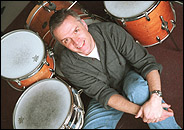All jazzed up
Having an opportunity to jam with the best was what concerned Karine Chapdelaine most two years ago, when the jazzwoman was searching for the perfect school to sharpen her musical talent.
 Professor Gordon Foote
Professor Gordon FootePHOTO: Owen Egan |
|
When she discovered there was considerable competition to be accepted as a jazz performance student in McGill's Faculty of Music, Chapdelaine wasn't scared. The information actually pushed the bass player to apply to the program.
"I figured because McGill was so selective about its jazz students, being accepted among them would give me an opportunity to play with excellent musicians year-round."
So exactly how hard is it to be granted entry as a jazz performance student? "Competition is stiff," says Professor Gordon Foote, chair of the Faculty of Music's Department of Performance and a saxophone instructor."Just last year, we had 135 applications for only 30 spots at the undergraduate level."
It's been that way since McGill started offering jazz performance degrees in 1982. And when the University began teaching jazz performance at the graduate level in 1992, the admission stakes went even higher, since only five jazz masters' students are accepted annually.
"We didn't even accept anyone in 1996," recalls Foote, "because having unqualified students can lower the value of our degrees."
That kind of quality control, he says, is what allows jazz students to hit all the right notes. "Our students are the cream of the crop."
Naturally, having a standout student body has translated into better-sounding jazz bands coming out of the Faculty of Music over the last 15 years. Indeed, the McGill University Jazz Orchestra is renowned for having a polished sound and the 22-member big band has often rivalled professional ensembles. The orchestra's six CDs were well received by jazz writers.
U.S. jazz critic Jack Bowers, for instance, has raved about the McGill Jazz Orchestra. In one article about the big band's CD Something Personal (1996-1997), he qualified the orchestra's record among the top 20 he'd gladly take along if marooned on a desert island. "Although composed entirely of students," he remarked, "the ensemble plays as well as any working play-for-pay band we've ever heard."
Released every two years since 1988, most CDs produced by the McGill Jazz Orchestra are culled from two years' worth of recordings by the ensemble, allowing for only the best tracks to survive.
Foote, who also directs the orchestra, considers these pared down recordings an essential calling card, "since people judge jazz programs by the recordings they release," he says.
High esteem for the band has resulted in its being invited to perform in gigs around the world.
Just last fall, the orchestra, aided by fundraising assistance from jazz buff and former alumni association director Gavin Ross, jetted off to Mexico to play in the 7th annual Festival Internacional de Jazz in San Miguel de Allende. The band has accepted invitations to perform in Ireland, New Orleans, France and across Canada.
Earlier this month, the orchestra grooved its way to New York City and the International Association of Jazz Educators (IAJE), which held a conference attended by 7,000 people from 35 countries.
Getting that gig was quite a coup for the band. "We were one of only five university bands picked to perform at the event," says Foote, "which was a great opportunity for McGill to showcase the talents of its music students."
That kind of exposure can also help McGill jazz students obtain jobs upon graduation. Foote says alumni end up working in a combination of jobs: from playing with groups and writing music to teaching the musical genre. Many graduates, he adds, are even recruited to play on cruise ships.
Wherever they decide to apply their skills, Foote says, jazz graduates leave McGill with a comprehensive education. It takes 101 credits to earn a jazz performance degree, which, unlike other music programs, includes no elective courses. Translation? Students are required to enrol in core classical courses that include music history, music theory and music ear-training, as well as the complete jazz curriculum.
One of the goals of that extra training is to help McGill jazz students master their improvisational skills -- a hallmark of good jazz players. As Foote says, "Improvisation is an art that's very complex, has many layers and requires several levels of learning."
If anyone thinks jazz students begrudge their lack of electives or find their program too far-ranging, think again. Alto sax player Donny Kennedy says, "The access I've had to information has been just unbelievable and one of the most valuable parts of the program."
Chapdelaine is equally enthusiastic. "All those courses are what allow us to know a little bit of everything," she says. "If I compare my course load to friends who are studying jazz at other universities, I'm learning much more at McGill."
The McGill Jazz Orchestra's latest CD, Sang Froid, is available through Gordon Foote via e-mail: foote@music.mcgill.ca.

